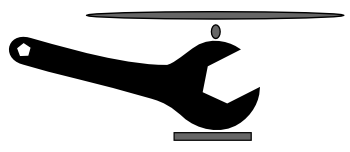We've been working to collate, combine, de-duplicate and align the contents of 5 existing tool registries from: The Open Planets Foundation (OPF), The National Digital Stewardship Alliance (NDSA), The Digital Curation Centre (DCC), The Digital Curation Exchange (DCE) and the Digital POWRR Project. There were of course quite a few duplicates to weed out but the scope and depth of COPTR now supercedes anything out there that I've seen previously, albeit with an inconsistency of depth between resulting tool registry entries. Each source registry had it's own differing characteristics. At one end of the scale the DCC registry had really strong detail but coverage of well under a hundred tools. The DCE registry included over three hundred tools but with each tool described in far less detail.
After much debate and consideration of
feedback from many sources (thanks to everyone who got in touch), we've settled on the all important tool registry structure and a technology with which to manage the data: Mediwiki. We've kept the structure minimal to make creation of new entries relatively quick. We've also kept things factual. Experiences and evidence of using tools can be captured elsewhere and referenced from COPTR. Mediawiki provides an environment that enables easy navigation of the registry (probably most usefully by
browsing via a tool's function) and that is quite straightforward for managing the data and
providing a feed of the data. A nice touch in the registry is use of RSS feeds and
Ohloh widgets to indicate how well supported (or otherwise) the codebase of a particular tool is. See an example on the
Archivematica page here.
So what happens next? The COPTR approach is not just to pool existing data in one place, but to remove the source registries from the web. The contributing organisations have committed to doing this, but first of course, they need to be happy that COPTR is ticking all the right boxes as a genuine replacement. So the next phase will be to take on board any final comment and ensure everyone is completey happy to move forward. The onus will then be on the contributors to remove their registries and perhaps explore utilising a feed of data from COPTR on their own sites.
Some thought also needs to be given to differences in aims and scope of the existing repsitories and COPTR. the Digital POWRR grid, for example, does a different job which doesn't easily align with COPTR. So there is some discussion to be had with the POWRR team over the next few days on how (and if) we might be able to bring things together more closely.
Perhaps most importantly we need *you* to help make this community resource a success. The data is still far from perfect. It needs tweaks, it needs more URLs, it needs entries for those important tools that are still missing. And most importantly it needs more references to your
digital preservation war stories.
Looking ahead we need to develop a roadmap, think about bringing in other registries, look at how we can encourage further editing and enhancement of COPTR data, and sound out interest in a hackathon to do cool things with the data feed. We would of course also appreciate any feedback on this beta launch of COPTR.
In a parallel action, an informal group of experts is looking to bring a question and answer site to digipres.org, to replace the abortive DP Stack Exchange. Watch this space….
Massive thanks go to the organisations who made this initiative possible, and kudos also to Andy Jackson for his terribly clever mediawiki skills.
Paul Wheatley
 Almost a year ago, I presented a proposal to the Aligning National Approaches to Digital Preservation (ANADP) group to create a community tool registry. I was frustrated by the profusion of tool registries and the lack of coordination between them. Pooling the knowledge in one place would result in a far better resource. It would be easier to discover new tools, to share experience in using them and to help avoid the tool development duplication we've seen so much of in the past. As ANADPII kicks off today in Barcelona, I'm very pleased to announce the beta launch of COPTR: the Community Owned digital Preservation Tool Registry.
Almost a year ago, I presented a proposal to the Aligning National Approaches to Digital Preservation (ANADP) group to create a community tool registry. I was frustrated by the profusion of tool registries and the lack of coordination between them. Pooling the knowledge in one place would result in a far better resource. It would be easier to discover new tools, to share experience in using them and to help avoid the tool development duplication we've seen so much of in the past. As ANADPII kicks off today in Barcelona, I'm very pleased to announce the beta launch of COPTR: the Community Owned digital Preservation Tool Registry.
